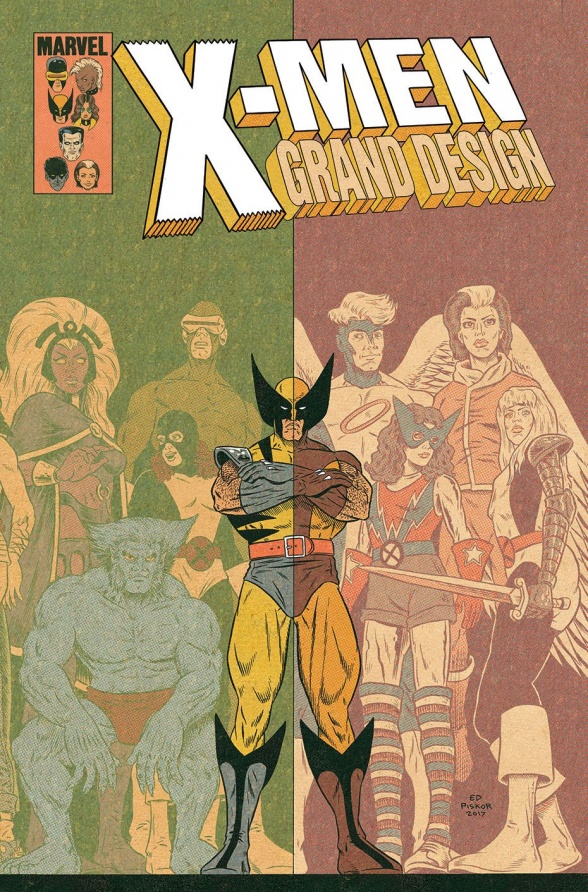Ed Piskor took on quite the task when he began “X-Men: Grand Design.” To quote the solicitation for the first volume, ‘X-MEN: GRAND DESIGN stitches together the most important moments in mutant history, creating a comprehensive narrative celebrating the X-Men’s past, present, and future.’
If anyone is up for that task, it is Piskor, whose “Hip Hop Family Tree” has been an incredible journey into hip hop culture, working as both a comic and a guidebook for an entire genre. “X-Men” history is slightly more convoluted than early 80s hip hop, but Piskor took to the challenge and knocked it out of the park. With volume 2 of “Grand Design,” called ‘Second Genesis,’ due out in July and August, we had a chance to chat with Piskor briefly about the series, as well as debut this exclusive variant cover.

Just in terms of making sense out of a sprawling mass of history/continuity, what’s the biggest lesson “Hip Hop Family Tree” taught you that paid off in putting “Grand Design” together? Especially in the first volume where you’ve mentioned not having as much personal connection to much of the material to fall back on?
Ed Piskor: Everything one does in the past should help build their present work, and this is no exception. Harvey Pekar’s writing gave me the ability to summarize and put things into focus. I used that education to make “Hip Hop Family Tree.” “HHFT” gave me tons of practice for using a giant ensemble cast, keeping things to the point, using the most of the provided space. Basically standard tradecraft stuff. You are correct about the bulk of the material in volume 1 not connecting with me on a personal way. We’d be hard-pressed to find a guy who goes bananas for Werner Roth’s “X-Men”…and cue the comments section for the inevitable contrarian.
You’ve mentioned the influence of “What If…?” on “Grand Design,” which I find interesting because people don’t usually name-check Jim Valentino when talking about your influences, but it really comes through now that I think about it, particularly his early issues of Volume 2. Is connecting his art sensibility to yours too off-base? If not, is he a conscious influence on your work or more acquired through osmosis?
EP: I was down with all the Image founding fathers but it wasn’t Valentino’s art or storytelling that stuck with me. It wasn’t the reason I connected with “What If…?” Vol. 2 either. I had a specific set of rules when I was buying comics a as a boy because I got hosed so much with the standard bait and switch where I accidentally bought a comic in the middle of a sprawling storyline which meant I didn’t know what the hell was going on. I’m a part of the last true vestige of the newsstand comics patrons and there was never a guarantee that I would be able to find part two of any story either. I didn’t know comic shops existed until I was 13 maybe.
What I loved about “What If…?” was that each issue was one and done. My favorite issue would have been the Rob Liefeld issue drawn over Valentino breakdowns. “What If…? Wolverine: Agent of Shield!”

That macro-view approach you use really helps you get across a ton of material to the reader a short amount of page real estates. Was there any particular moment in the first “Grand Design” mini you wish you could have ‘zoomed in’ and spent more time on? And if it’s not giving anything away, any in “Second Genesis?”
EP: Perhaps there is, but nothing comes to mind because of the specificity of the way the project works. I have a specific amount of pages each issue, I want to fit in a certain amount of the comics series into each issue and once I identify the most important arcs, contrived or otherwise, then I put the comic together. I’m sure there’s some bits I would have liked to keep here and there but my general pragmatism doesn’t allow for much weeping. Thankfully, the original series is there, in stone, for all time. My comic is different. Call it an adaptation. Call it a remix. Call it whatever you like, but it’s important to know that it is not a simple “retelling”.
Continued belowYou got a chance to meet up with Chris Claremont before embarking on Grand Design. What was it like getting to engage with him as a fellow creator/peer? And what was the biggest surprise for you coming out of that “shop talk” opportunity?
EP: The one thing social media and the internet has made me incredibly aware of that many, if not most, people lack sufficient self awareness. I promise I didn’t engage him as a fellow creator or peer and I was fully humbled as a student in the game to be with him. Mouth shut. Ears open.
One fanboy surprise was learning who Wolverine’s mother is, and how that was to unfold, but I ain’t tellin’. It’s Claremont’s story to tell.
Looking back on his run, Magneto jumps out as the character that (almost literally) grows & changes the most over that 17-year span, going from archvillain to uneasy ally to headmaster/Xavier surrogate (who can forget Michael Xavier?). Fan reactions to where Claremont took him have been polarizing, to say the least. Do you feel the X-Men are best served with Magneto as a villain or something else?
EP: I can say this– He’s an opponent to the X-Men in my comic. I’m such a fan of the Claremont X-Men series that I’m just along for the ride. “Tell me a story, Chris!” I’ll accept whatever they were serving.
I just plotted the last book and it wasn’t something I had to put that much thought into. When I think of Magneto though, he’s the flawed opponent to Xavier’s methods. I wouldn’t use “villain” because that always makes me think of a one-dimensional, Snidely Whiplash kinda guy or something,



